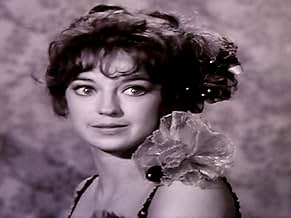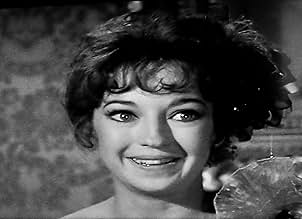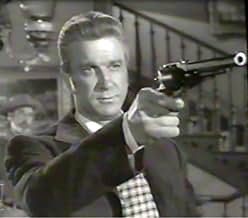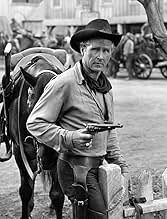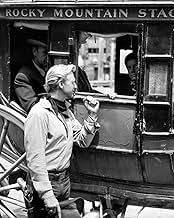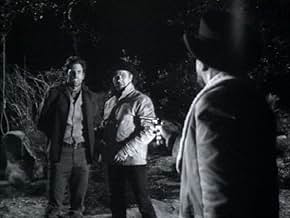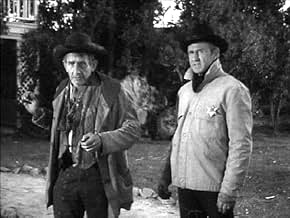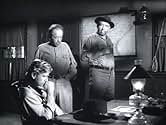Ajouter une intrigue dans votre langueA wandering ex-soldier encounters various problems wherever he visits in his travels.A wandering ex-soldier encounters various problems wherever he visits in his travels.A wandering ex-soldier encounters various problems wherever he visits in his travels.
Parcourir les épisodes
Avis à la une
This is a brilliant western. I can see why it only lasted one season. It shows the west as it really was. The episodes frequently do not have happy endings. They are often thoughtful and disturbing. Rod Serling's writing is top notch, as good as on the Twilight Zone.
Powerful.
In its own modest way, the single best television series Lloyd Bridges ever helmed. Though it only lasted 26 half-hour episodes in the mid-1960s, this rumination on the psychological and moral readjustments anguishing former Union soldier William Colton (Bridges) as he returns to the trail of a loner in post-Civil War America, had a freeform, experimental texture unlike any television western of its day -- most likely due to the significant contribution made to its teleplays by Rod Serling. Great direction and dialogue, too. The premiere episode, "An Echo of Bugles, " featuring an unforgettably poignant performance by a virtually unrecognizable Whit Bissell as "weak-as-a-kitten" former Confederate POW "Ab Nichols", sets the tone for this meditation on the lingering schizophrenia of divided loyalties that plagued our post-Lincolnian land as Grant assumed its presidency. A revelation to be rediscovered -- best writing of any TV Western I ever encountered. Truly a Western with an adult sensibility, obviously created as a centennial reflection on the aftermath of the War Between the States as seen through the eyes of the quintessential American cowboy archetype of the "loner". Serling will never be duplicated and, boy, is he missed! Haunting and haunted.
Rod Serling is a genius, and most all of his scripts bear his own persona, even if they are not written by him exclusively. After the huge success of The Twilight zone it wasn't easy for Rod to top it off with something better or at least as good but I think he managed just that with The Loner.
It's a story of a civil war veteran, played beautifully by Lloyd Bridges, who is traveling around, helping people in distress and trying to find a purpose in life after four senseless years of lives taking. I have to admit the strongest feature of this series was not the scripts per se, although most of them are engaging and thought-provoking to say the least, but the dialogues the scripts are provided with - this is the most well-written TV series I've seen in a while. Add some of the finest performances and absolutely excellent main musical theme by maestro Jerry Goldsmith in there and you'll get a sure hit on your hands but somehow this show was cancelled after its only season of 26 episodes and was forgotten ever since.
So what happened? Some critics supposed the show was too serious for a Western series, the others found it too boring to stick around for but I'd say The Loner's main problem is that it lacks direction and its little stories of the week didn't really go anywhere besides some lonely thoughts scattered all over the episodes, along with great one-off performances by guest stars, such as Leslie Nielsen or Bridges' own sons, Beau and Jeff. The universe of The Loner is limited to one-two episodes, usually ending abruptly and by the next episode he's already onto his next adventure. I admit his moral standards are high and his strong personality and beliefs lead the plots but in the end it doesn't work as a big concept but just as a bunch of stories you would tell your children to before they go to bed.
Whereas Maverick was also mostly a "story of the week" show it had its own atmosphere, its own little world, multiple characters, this big family who helped each other out and fought the injustices. The Loner is a one man show on the other hand, he doesn't rely on anyone and fights the injustices all by himself but it doesn't feel like this world of his is thorough and maybe, had the show been renewed for a second season, we would've seen the show grow stronger and wider but judging by what we have I cannot say this is a complete and whole body of work but rather an anthology of stories revolving around one character. Maybe that's why the show got cancelled, because Rod Serling was so used to telling all those different stories but not in one big piece.. well, we'll never know.
It's a story of a civil war veteran, played beautifully by Lloyd Bridges, who is traveling around, helping people in distress and trying to find a purpose in life after four senseless years of lives taking. I have to admit the strongest feature of this series was not the scripts per se, although most of them are engaging and thought-provoking to say the least, but the dialogues the scripts are provided with - this is the most well-written TV series I've seen in a while. Add some of the finest performances and absolutely excellent main musical theme by maestro Jerry Goldsmith in there and you'll get a sure hit on your hands but somehow this show was cancelled after its only season of 26 episodes and was forgotten ever since.
So what happened? Some critics supposed the show was too serious for a Western series, the others found it too boring to stick around for but I'd say The Loner's main problem is that it lacks direction and its little stories of the week didn't really go anywhere besides some lonely thoughts scattered all over the episodes, along with great one-off performances by guest stars, such as Leslie Nielsen or Bridges' own sons, Beau and Jeff. The universe of The Loner is limited to one-two episodes, usually ending abruptly and by the next episode he's already onto his next adventure. I admit his moral standards are high and his strong personality and beliefs lead the plots but in the end it doesn't work as a big concept but just as a bunch of stories you would tell your children to before they go to bed.
Whereas Maverick was also mostly a "story of the week" show it had its own atmosphere, its own little world, multiple characters, this big family who helped each other out and fought the injustices. The Loner is a one man show on the other hand, he doesn't rely on anyone and fights the injustices all by himself but it doesn't feel like this world of his is thorough and maybe, had the show been renewed for a second season, we would've seen the show grow stronger and wider but judging by what we have I cannot say this is a complete and whole body of work but rather an anthology of stories revolving around one character. Maybe that's why the show got cancelled, because Rod Serling was so used to telling all those different stories but not in one big piece.. well, we'll never know.
10Owlwise
Here's another of those blink-and-you-missed-it gems lost among the tide of ridiculous, cotton candy TV shows that were insulting to both adults & children alike in the mid-1960s. Rod Serling crafted something rich & meaningful in his series about a former Union officer in search of himself - and maybe America too - in the wake of the Civil War. While it clearly addressed the divisions widening in 1960s America, it's just as applicable today, when those divisions have not only reappeared but widened all the more.
But let's make one thing clear: like everything Rod Serling did, this is solid entertainment that stirs the heart as much as it engages the mind. A wonderful example of the humanist tradition in early TV its concerns are[t just social, they're very much personal. How does a man who has seen the horrors of war, participated in them himself, begin to find peace, understanding, and a place for himself in the world? For that matter, how does anyone who has lived through turmoil, hatred, death, whether in the military or not? What is a life really all about?
Wisely, "The Loner" offered no pat answers. If it offered any at all, it was that the seeking was what mattered, the continual struggle to confront both outer & inner darkness & despair, to strive for some sort of meaning in an uncertain, unmoored world.
In Lloyd Bridges, the series found its perfect lead. Capable of showing both stoic strength & revealing fears & doubts as well, he embodied a basically good & decent man with both strength & sensitivity - a man of character & soul. And he wasn't afraid to show the weaknesses that beset all men, but are seldom revealed by many, to their own further wounding. And all the while, he's searching & learning ...
Finally released on DVD, this sadly short-lived series is a treasure waiting to be discovered by anyone who loves quality TV.
But let's make one thing clear: like everything Rod Serling did, this is solid entertainment that stirs the heart as much as it engages the mind. A wonderful example of the humanist tradition in early TV its concerns are[t just social, they're very much personal. How does a man who has seen the horrors of war, participated in them himself, begin to find peace, understanding, and a place for himself in the world? For that matter, how does anyone who has lived through turmoil, hatred, death, whether in the military or not? What is a life really all about?
Wisely, "The Loner" offered no pat answers. If it offered any at all, it was that the seeking was what mattered, the continual struggle to confront both outer & inner darkness & despair, to strive for some sort of meaning in an uncertain, unmoored world.
In Lloyd Bridges, the series found its perfect lead. Capable of showing both stoic strength & revealing fears & doubts as well, he embodied a basically good & decent man with both strength & sensitivity - a man of character & soul. And he wasn't afraid to show the weaknesses that beset all men, but are seldom revealed by many, to their own further wounding. And all the while, he's searching & learning ...
Finally released on DVD, this sadly short-lived series is a treasure waiting to be discovered by anyone who loves quality TV.
10lprigge
Amazing how few people know of this TV series, and I was addicted to it as a teen in the 60s. Lloyd Bridges played a veteran of the Civil War, and the episodes were poignant because he never found peace even when helping people. And no, it wasn't like Chuck Connors in Branded - the stories were much more thoughtful and less physical. Rod Serling wrote the scripts, which I remember as being top notch and, in usual Serling style, thought provoking. What I particularly remember is the beautiful intro theme to the series - to this day, I can hear it and would love to own it. I've watched some of the episodes at the Museum of Radio and Television in NYC - unfortunately, they don't even have all of the episodes last I checked. Definitely an overlooked - and greatly underrated - classic TV Western.
Le saviez-vous
- AnecdotesLloyd Bridges' character was armed with an original M1860 Spencer carbine which was a very appropriate arm for the western period, but not the usual firearm of choice for any TV cowboy in those days. Bridges never fired his Spencer carbine although he did display it once in awhile to protect himself. The primary reason was due to the difficulty of the production company's armorer finding or making blanks of the long-obsolete .50 rim-fire cartridge the Spencer was chambered for. Reproductions of the Spencer carbine are now available in more modern calibers if they ever decide to bring back the show or add a bit more authenticity to another.
- ConnexionsFeatured in American Masters: Rod Serling: Submitted for Your Approval (1995)
Meilleurs choix
Connectez-vous pour évaluer et suivre la liste de favoris afin de recevoir des recommandations personnalisées
- How many seasons does The Loner have?Alimenté par Alexa
Détails
- Date de sortie
- Pays d’origine
- Langue
- Aussi connu sous le nom de
- Cavaliere solitario
- Lieux de tournage
- Sociétés de production
- Voir plus de crédits d'entreprise sur IMDbPro
- Durée
- 30min
- Couleur
- Rapport de forme
- 1.33 : 1
Contribuer à cette page
Suggérer une modification ou ajouter du contenu manquant

